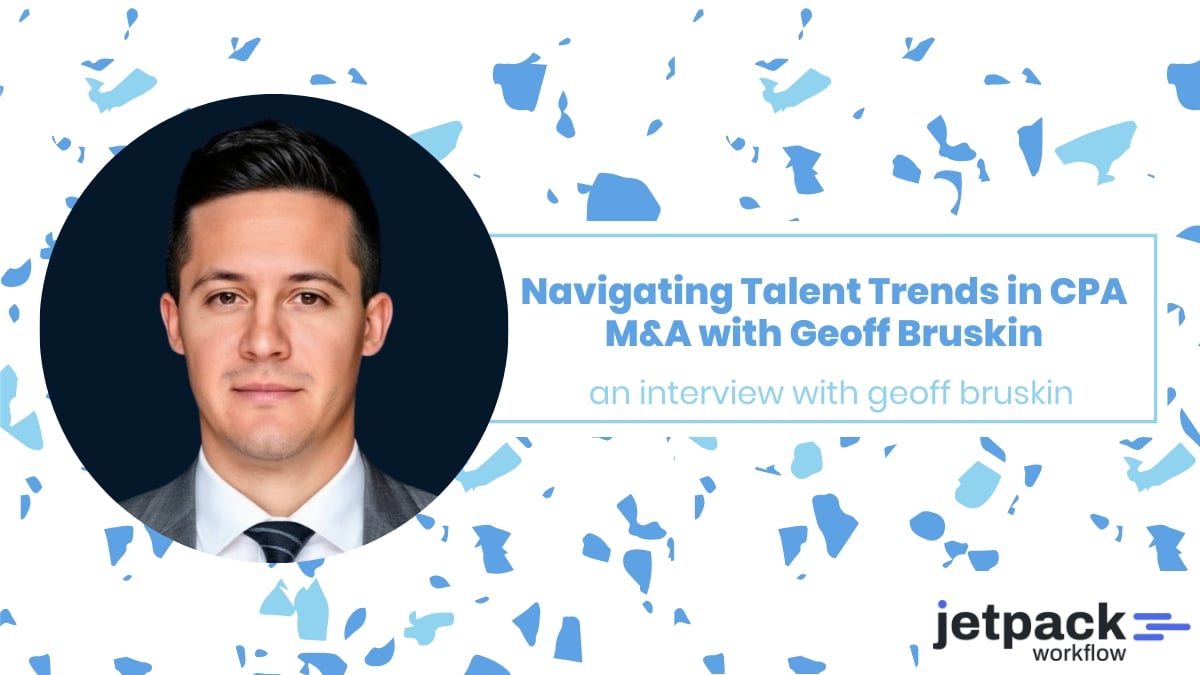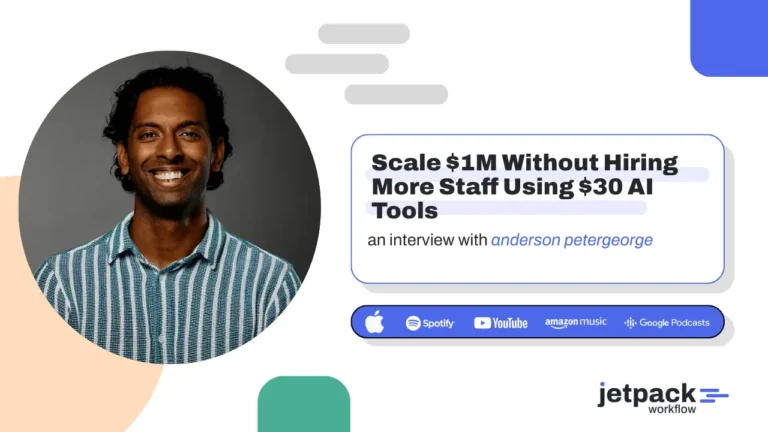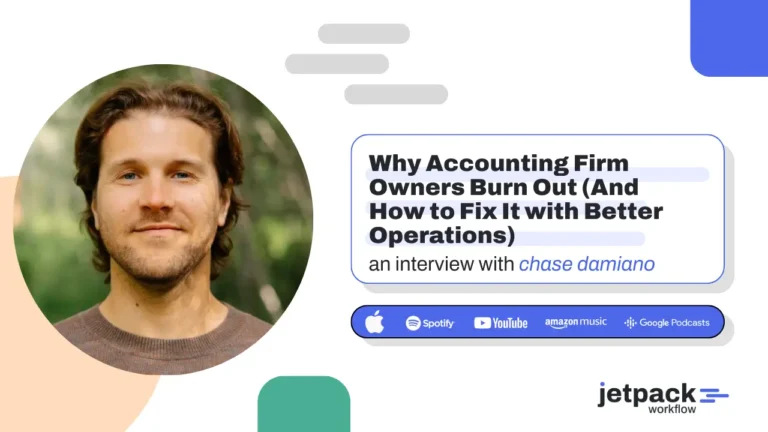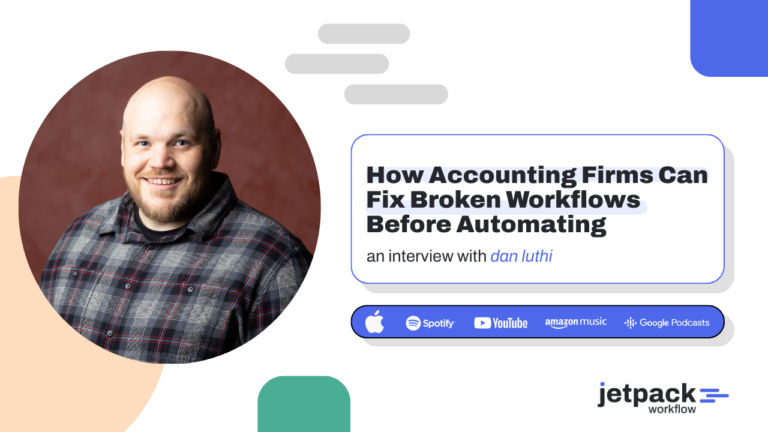Navigating Talent Trends in CPA M&A with Geoff Bruskin

Podcast
Summary
In this episode of Growing Your Firm, host David Crostello welcomes back Geoff Bruskin, founder of White Tiger Connections, to discuss the evolving landscape of talent in the accounting profession. Geoff shares insights from his extensive experience in mergers and acquisitions (M&A) for CPA firms, emphasizing the growing importance of talent acquisition and retention in today’s market. He outlines the dual trends of M&A and talent, as well as the impact of technology on these areas.
Additionally, Geoff introduces his recent venture into business brokerage, helping CPA clients sell their businesses, further enhancing the services offered to the accounting community. Tune in for a thought-provoking conversation that explores how firms can leverage talent and technology to thrive in a competitive environment.
Guest Bio
Geoff Bruskin is a distinguished figure in the realm of mergers and acquisitions (M&A) within the accounting profession, known for his innovative approach to talent acquisition and business growth strategies. As the founder and leader of White Tiger Connections, Geoff has dedicated his career to facilitating transactions that empower CPA firms to thrive in an increasingly competitive landscape. His expertise extends beyond M&A; he is also a recognized authority in recruiting for the CPA profession, helping firms not only to grow through acquisitions but also to build robust teams that drive sustainable success.
With a career spanning several years, Geoff has been at the forefront of transformative changes in the accounting industry. He has successfully led numerous transactions, connecting CPA firms with private equity, wealth management entities, and independent firms. His deep understanding of the nuances of the accounting sector allows him to navigate complex deals with finesse, ensuring that both buyers and sellers achieve their strategic objectives.
Geoff’s philosophy centers around the belief that talent is the cornerstone of any successful organization. He emphasizes the importance of cultivating a team that is not only skilled but also aligned with the firm’s vision and values. His insights into talent acquisition and retention are particularly relevant in today’s market, where firms face significant challenges in attracting and keeping top talent. Geoff advocates for a proactive approach to talent management, encouraging firms to rethink their hiring strategies and to leverage technology to enhance their operational efficiency.
In addition to his work in M&A and recruiting, Geoff has recently expanded his focus to include business brokerage services, assisting CPA firms in helping their clients sell their businesses. This holistic approach reflects his commitment to supporting the entire ecosystem surrounding accounting firms, ensuring that they can provide comprehensive solutions to their clients.
Geoff’s achievements are underscored by his ability to identify and capitalize on emerging trends within the industry. He recognizes that the landscape of accounting is evolving, driven by advancements in technology and changing client expectations. By integrating technology enablement into the M&A and recruiting conversations, Geoff helps firms optimize their operations and unlock new growth opportunities.
His thought leadership is further exemplified through his new podcast, Nexus Point, where he shares insights and case studies related to M&A and recruiting in the accounting space. Through this platform, Geoff aims to educate and inspire other professionals in the industry, fostering a community of forward-thinking leaders who are eager to embrace change and drive innovation.
In summary, Geoff Bruskin is not just a transactional expert; he is a visionary leader who understands the intricate dynamics of the accounting profession. His commitment to talent development, strategic growth, and technological integration positions him as a trusted advisor and a catalyst for change in the industry. As he continues to navigate the complexities of M&A and talent acquisition, Geoff remains dedicated to empowering CPA firms to achieve their full potential and to thrive in an ever-evolving marketplace.
The Importance of Talent Acquisition and Retention in Firm Growth
In a recent podcast episode featuring Geoff Bruskin, the discussion highlights the critical role that talent acquisition and retention play in the growth of firms, particularly within the accounting sector. As firms strive to expand their operations and increase market share, addressing talent-related challenges becomes a significant bottleneck that can impede progress. Here are some key points from the episode that underscore this importance:
1. Talent as a Bottleneck for Growth
Geoff emphasizes that while mergers and acquisitions (M&A) and technology are often discussed as avenues for growth, the real bottleneck lies in understanding and managing talent. Firms that struggle with talent acquisition and retention find themselves lagging in their growth initiatives, especially if they attempt to navigate these challenges without a strong, capable team in place.
2. The Impact of Team Dynamics
A well-functioning team is essential for integrating new technologies and optimizing operations. Geoff points out that if a firm lacks a humble, ambitious, and collaborative team, it will struggle to implement changes effectively. The right team can accelerate decision-making processes and enhance the firm’s ability to adapt to new tools and methodologies, such as integrating AI technologies like ChatGPT.
3. Talent Acquisition Strategies
The episode discusses the importance of having a strategic approach to hiring. For instance, a $10 million firm mentioned in the conversation faced challenges in hiring a leader for a new function. After two failed attempts, they considered acquiring another firm instead. This highlights the need for firms to be proactive in their talent strategies, whether through hiring, acquiring, or partnering with other firms to access the right talent.
4. Compensation and Work Environment
Geoff notes that firms capable of offering competitive compensation packages can attract top talent. The example of the $10 million firm illustrates that by paying at the top percentile of the market, they can secure high-quality employees who significantly contribute to the firm’s efficiency and profitability. Additionally, creating a remote work environment can broaden the talent pool, allowing firms to access skilled professionals who may not be available locally.
5. Long-Term Vision and Succession Planning
The conversation also touches on the importance of having a long-term vision for talent management. Firms need to consider not just immediate hiring needs but also succession planning and how to retain talent over time. This is particularly relevant for firms looking to grow through acquisitions, as they must ensure that the acquired talent aligns with their strategic goals and can contribute to future growth.
6. Unlocking Business Opportunities
Ultimately, addressing talent acquisition and retention can unlock further business decisions and opportunities. As firms become more adept at managing their talent, they can explore new markets, expand their service offerings, and enhance their operational efficiencies. Geoff argues that firms that successfully navigate these talent challenges will be better positioned to capitalize on growth opportunities, whether through organic growth or strategic acquisitions.
Conclusion
In summary, the episode underscores that talent acquisition and retention are not merely HR issues; they are fundamental to a firm’s growth strategy. By prioritizing these areas, firms can overcome bottlenecks, enhance their operational capabilities, and unlock new avenues for business development. As the landscape of the accounting profession continues to evolve, firms that invest in their talent will be the ones that thrive.
The Importance of Talent Acquisition and Retention in CPA Firms
In the podcast episode featuring Geoff Bruskin, the discussion centers around the critical role of talent acquisition and retention in the success of CPA firms, particularly in the context of mergers and acquisitions (M&A) and the evolving landscape of the accounting profession.
The Current Landscape
Geoff highlights that the accounting industry is undergoing significant changes, with private equity (PE) firms showing interest in acquiring CPA firms. However, amidst this activity, a pressing issue remains: the challenge of attracting and retaining top talent. As firms look to grow and expand, they often find themselves struggling to hire the right people, which can hinder their progress.
The Bottleneck of Talent
The episode emphasizes that while transactions and valuations in the CPA space are on the rise, the real bottleneck lies in understanding and managing talent. Geoff points out that many firms perpetually complain about talent shortages but fail to take innovative steps to address the issue. He argues that the key to unlocking growth and making informed decisions in M&A is to focus on talent acquisition and retention strategies.
Case Study: A $10 Million Firm
Geoff shares a compelling case study of a $10 million CPA firm that is thriving but aspires to grow to $100 million. The firm has a strong niche focus and a solid understanding of the talent landscape within their industry. However, despite their success, they have struggled to hire a leader for a new function they want to develop. After two failed attempts to bring someone on board, they began to consider acquiring another firm instead.
This scenario illustrates a common challenge: even successful firms can face difficulties in hiring the right talent, leading them to explore M&A as an alternative solution. Geoff stresses that if they do acquire another firm, they will still need to address the talent issue, as the acquired firm may also have its own succession planning challenges.
The Role of Compensation and Culture
One of the key takeaways from the discussion is the importance of compensation and workplace culture in attracting top talent. The $10 million firm in the case study has the financial capability to offer competitive salaries, which allows them to attract high-quality candidates. However, Geoff notes that compensation is just one piece of the puzzle. A collaborative, forward-thinking culture is equally important in retaining talent and ensuring that employees are engaged and productive.
Solutions to Talent Challenges
Geoff suggests several strategies for CPA firms to enhance their talent acquisition and retention efforts:
- Remote Work Opportunities: By offering remote work options, firms can access a broader talent pool and attract candidates who may not be willing to relocate.
- Dynamic Thinking: Firms need to think creatively about their hiring strategies, including considering offshoring and flexible compensation models.
- Consulting Expertise: Engaging with consultants who specialize in the accounting industry can provide valuable insights and access to potential candidates or acquisition opportunities.
- Focus on Operations and Technology: Improving operational efficiency and leveraging technology can create a more attractive work environment for potential hires.
Conclusion
The episode underscores that talent acquisition and retention are not just HR issues; they are fundamental to the growth and sustainability of CPA firms. As the industry continues to evolve, firms that prioritize their talent strategies will be better positioned to navigate the complexities of M&A and achieve their growth objectives. By addressing these challenges head-on, firms can unlock significant potential and drive their success in an increasingly competitive landscape.
Exploring Growth Strategies for Accounting Firms
In the competitive landscape of accounting, firms must adopt a multifaceted approach to growth. As discussed in the podcast episode featuring Geoff Bruskin, there are several strategies that firms can consider, including hiring talent, acquiring other businesses, or bringing in outside investment. Each of these options has its own set of advantages and challenges, and firms should evaluate them carefully to determine the best fit for their specific goals.
1. Hiring Talent
One of the most direct ways to foster growth is through hiring. However, the podcast highlights that simply bringing in new employees is not enough. Firms need to focus on attracting top-tier talent who can contribute to their growth objectives. This involves:
- Competitive Compensation: Firms that offer salaries in the top percentile can attract high-quality candidates. For instance, the $10 million firm discussed in the episode was able to pay above market rates, ensuring they could hire A-level talent.
- Cultural Fit and Training: It’s essential to find candidates who not only have the right skills but also fit well within the firm’s culture. The ability to train individuals from different industries or functions can also expand the talent pool.
- Creating a Remote Workforce: Embracing remote work can significantly widen the talent pool, allowing firms to access skilled professionals from various locations.
2. Acquiring Other Businesses
Acquisition is another powerful strategy for growth. The podcast illustrates this through the example of a $10 million firm looking to expand into an ancillary category by acquiring a smaller firm. Key considerations include:
- Identifying the Right Targets: Firms should look for acquisition targets that complement their existing services or allow them to enter new markets. The $10 million firm aimed to acquire a $2 million business in a different function within the same industry.
- Understanding the Market: Before pursuing an acquisition, firms must assess why the target company is on the market. Often, firms are selling due to talent issues or succession planning challenges, which could pose risks for the acquiring firm.
- Integration Challenges: Acquiring a business is not just about the transaction; firms must also plan for how to integrate the new company and its employees into their existing operations.
3. Bringing in Outside Investment
Outside investment can provide the necessary capital for growth without the immediate pressure of operational control. This strategy can take various forms:
- Minority or Majority Stake Sales: Firms can consider selling a portion of their equity to investors, which can provide liquidity and access to additional resources. This approach allows the original owners to retain control while benefiting from the expertise and capital of investors.
- Strategic Partnerships: Collaborating with other firms or investors can create synergies that enhance growth potential. For example, a firm might partner with a wealth management company to offer integrated services, thereby expanding its client base.
Evaluating Each Option
As firms consider these growth strategies, it’s crucial to evaluate each option based on their unique circumstances and goals. Factors to consider include:
- Market Conditions: Understanding the current market landscape and trends can inform which strategy may be most effective.
- Internal Capabilities: Firms should assess their internal resources and capabilities to determine whether they are better positioned to hire, acquire, or seek investment.
- Long-Term Vision: Aligning growth strategies with the firm’s long-term vision is essential. Whether the goal is to scale rapidly, enhance service offerings, or improve profitability, the chosen strategy should support that vision.
In conclusion, accounting firms should not limit themselves to a single growth strategy. By considering a combination of hiring, acquisitions, and outside investment, and evaluating each option carefully, firms can position themselves for sustainable growth and success in a dynamic market.
The Importance of Talent Acquisition and Retention in CPA Firms
In the podcast episode featuring Geoff Bruskin, the discussion centers around the critical role of talent acquisition and retention in the success of CPA firms, particularly in the context of mergers and acquisitions (M&A) and the evolving landscape of the accounting profession.
The Current Landscape
Geoff highlights that the accounting industry is undergoing significant changes, with private equity (PE) firms showing interest in acquiring CPA firms. However, amidst this activity, a pressing issue remains: the challenge of understanding and managing talent. As firms look to grow and expand, they often find themselves struggling with hiring and retaining the right people. This bottleneck can slow down progress and hinder the integration of new technologies, such as AI tools like ChatGPT.
The Talent Bottleneck
The conversation reveals that many firms are perpetually complaining about talent shortages but are not taking innovative steps to address the issue. Geoff emphasizes that the key to unlocking growth and making informed decisions lies in how firms approach talent. He argues that having a humble, ambitious, and collaborative team can significantly accelerate a firm’s ability to adapt and thrive in a competitive environment.
Case Study: A $10 Million Firm
Geoff shares a compelling case study of a $10 million CPA firm that is thriving with a 40% profit margin. The firm, led by young founders, is looking to expand into an ancillary category within the same industry. They have a strong understanding of talent in their market and are fully remote, which gives them a competitive edge in accessing a broader talent pool.
However, despite their success, they have faced challenges in hiring a leader for their new function. After two failed attempts to bring someone on board, they are considering acquiring a smaller firm instead. Geoff points out that this approach may not solve their talent problem, as the firm they are looking to acquire may also have succession planning challenges and may not have the right leadership in place.
The Need for a Comprehensive Strategy
Geoff stresses that firms must consider multiple avenues to address their talent needs. This includes hiring, acquiring other firms, and potentially bringing in consultants or recruiters who specialize in the accounting industry. He suggests that firms should not dismiss any option and should evaluate each opportunity on a case-by-case basis.
The Role of Education and Access
A significant takeaway from the episode is the importance of education and access in navigating the talent landscape. Firm owners need to be educated about the implications of their decisions and the realities of the market. By understanding the risks and opportunities, they can make informed choices that will ultimately lead to better outcomes.
Conclusion
In conclusion, the episode underscores that talent acquisition and retention are not just HR issues; they are fundamental to the growth and sustainability of CPA firms. As the industry continues to evolve, firms that prioritize talent and adopt innovative strategies will be better positioned to thrive in a competitive landscape. By leveraging technology, understanding market dynamics, and being open to creative solutions, CPA firms can unlock significant growth potential and navigate the complexities of the modern accounting environment.
The landscape of mergers and acquisitions (M&A) in the accounting profession is undergoing significant transformation, driven by the need for firms to adapt their strategies to attract and retain talent. As discussed in the podcast episode featuring Geoff Bruskin, the evolution of this landscape is influenced by several key factors:
1. Talent as a Bottleneck
One of the primary challenges facing accounting firms today is the understanding and management of talent acquisition and retention. As firms look to grow and expand, they often find themselves struggling to hire the right people. Geoff highlights that many firms are perpetually complaining about talent shortages but are not taking innovative steps to address these issues. This disconnect can slow down growth and hinder the integration of new technologies, such as AI and automation tools.
2. The Importance of a Strong Team
The podcast emphasizes that having a humble, ambitious, and collaborative team is crucial for navigating the complexities of M&A. Firms that invest in building a strong internal culture and team dynamics are more likely to succeed in their growth initiatives. A well-functioning team can facilitate faster decision-making and more effective integration of new technologies, ultimately leading to better outcomes in M&A transactions.
3. Niche Specialization and Remote Work
Firms that specialize in niche markets can leverage their expertise to attract top talent. Geoff shares the example of a $10 million firm that has successfully carved out a niche and is now looking to expand into an ancillary category. By focusing on a specific industry and function, these firms can better understand the talent landscape and create attractive compensation models that appeal to high-caliber candidates. Additionally, the ability to offer remote work options significantly broadens the talent pool, allowing firms to compete more effectively in a tight labor market.
4. Integrated Services as a Competitive Advantage
The podcast discusses the growing trend of integrated services within the accounting profession, particularly as firms face competition from wealth management firms that are expanding their service offerings. As firms like Fidelity and Schwab provide comprehensive financial services, accounting firms must adapt by offering similar integrated solutions. This shift not only enhances client retention but also creates new opportunities for talent acquisition, as professionals are drawn to firms that can provide a broader range of services.
5. Creative Deal Structures
As firms consider M&A as a strategy for growth, they must also think creatively about deal structures. Geoff points out that many firms are exploring options beyond traditional acquisitions, such as minority stakes or partnerships that allow for shared growth. This approach can be particularly appealing to younger firm owners who are looking for ways to scale without relinquishing full control. By offering equity stakes or profit-sharing arrangements, firms can attract talent that is motivated by long-term growth potential.
6. The Role of Consultants and Advisors
Finally, the podcast underscores the importance of working with consultants and advisors who understand the M&A landscape. These professionals can help firms navigate the complexities of talent acquisition, deal structuring, and market positioning. By leveraging expert insights, firms can make informed decisions that align with their growth objectives and talent strategies.
In conclusion, the evolving landscape of M&A in the accounting profession requires firms to be proactive in addressing talent challenges, embracing niche specialization, and offering integrated services. By adapting their approaches and considering creative deal structures, firms can position themselves for success in a competitive market.
Timestamps
[00:02:08] Talent acquisition and retention.
[00:04:51] Niche market growth strategies.
[00:10:07] Succession planning challenges in firms.
[00:11:50] Talent acquisition challenges in firms.
[00:15:20] Buyer becomes seller scenario.
[00:17:13] Wealth management integration strategies.
[00:23:19] Finding the right hire.
[00:26:42] Order of magnitude scale possibility.
[00:27:39] New podcast and M&A insights.





